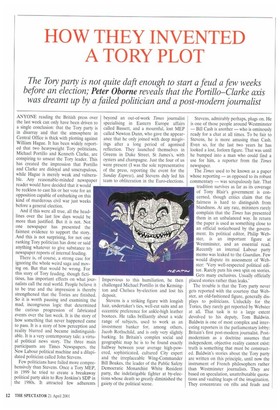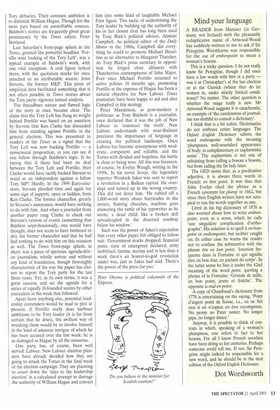HOW THEY INVENTED A TORY PLOT
The Tory party is not quite daft enough to start a feud a few weeks
before an election; Peter (Thorne reveals that the Portillo—Clarke axis
was dreamt up by a failed politician and a post-modem journalist
ANYONE reading the British press over the last week can only have been driven to a single conclusion: that the Tory party is in disarray and that the atmosphere in Central Office is thick with plotting against William Hague. It has been widely reported that two heavyweight Tory politicians, Michael Portillo and Kenneth Clarke, are conspiring to unseat the Tory leader. This has created the impression that Portillo and Clarke are disloyal and unscrupulous, while Hague is merely weak and vulnerable. Any reasonable-minded newspaper reader would have decided that it would be reckless to cast his or her vote for an opposition capable of embarking on this kind of murderous civil war just weeks before a general election.
And if this were all true, all the headlines over the last few days would be more than justified. But it is not. Not one newspaper has presented the faintest evidence to support the story. And this is not surprising, for not one ranking Tory politician has done or said anything whatever to give substance to newspaper reports of internal feuding.
There is, of course, a strong case for ignoring the whole weird saga and moving on. But that would be wrong. For this story of Tory feuding, though fictitious, has important effects on what journalists call the real world. People believe it to be true and the impression is thereby strengthened that the Tories are finished. So it is worth pausing and examining the mad, incongruous logic that determined the curious progression of fabricated events over the last week. It is the story of how something that never happened came to pass. It is a story of how perception and reality blurred and became indistinguishable. It is a very contemporary tale: a virtual political news story. The three main participants are Times Newspapers, the New Labour political machine and a dilapidated politician called John Stevens.
Few politicians have failed more comprehensively than Stevens. Once a Tory MEP, in 1999 he tried to create a breakaway political party akin to Roy Jenkins's SDP in the 1980s. It attracted few adherents beyond an out-of-work Times journalist specialising in Eastern Europe affairs called Bassett, and a mournful, lost MEP called Newton Dunn, who gave the appearance that he only joined with deep misgivings after a long period of agonised reflection. They launched themselves in Greens in Duke Street, St James's, with oysters and champagne. Just the four of us were present (I was the sole representative of the press, reporting the event for the Sunday Express), and Stevens duly led his team to obliteration in the Euro-elections.
Impervious to this humiliation, he then challenged Michael Portillo in the Kensington and Chelsea by-election and lost his deposit.
Stevens is a striking figure with longish hair, undertaker's ties, well-cut suits and an eccentric preference for ankle-high leather bootees. He talks brilliantly about a wide range of subjects, used to work as an investment banker for, among others, Jacob Rothschild, and is only very slightly barking. In Britain's complex social and geographic map he is to be found exactly halfway between your average high-powered, sophisticated, cultured City expert and the irreplaceable Wing-Commander Bill Boakes, the leader of the Public Safety Democratic Monarchist White Resident party, the indefatigable fighter at by-elections whose death so greatly diminished the gaiety of the political scene.
Stevens, admirably perhaps, plugs on. He is one of those people around Westminster — Bill Cash is another — who is ominously ready for a chat at all times. To be fair to Stevens, he is more amusing than Cash. Even so, for the last two years he has looked a lost, forlorn figure. That was until he bumped into a man who could find a use for him, a reporter from the Times newspaper.
The Times used to be known as a paper whose reporting — as opposed to its robust commentary — was scrupulously fair. That tradition survives as far as its coverage of Tony Blair's government is concerned, though critics claim that the fairness is hard to distinguish from blandness. At any rate, ministers rarely complain that the Times has presented them in an unbalanced way. In return the paper is used as something close to an official noticeboard by the government. Its political editor, Philip Webster, is an important figure at Westminster, and an essential read. Recently an internal Labour party memo was leaked to the Guardian. Few would dispute its assessment of Webster: 'Very well-respected political editor. Rarely puts his own spin on stories. Gets many exclusives. Usually officially placed stories rather than leaks.'
The trouble is that the Tory party never gets reported with the courtesy that Webster, an old-fashioned figure, generally displays to politicians. Unluckily for the Tories, they rarely get reported by Webster at all. That task is to a large extent devolved to his deputy, Tom Baldwin. Baldwin is one of most complex and interesting reporters in the parliamentary lobby: Britain's first post-modern journalist. Postmodernism as a doctrine assumes that independent, objective reality cannot exist: truth is something that must be constructed. Baldwin's stories about the Tory party are written on this principle, until now the instrument of French philosophers rather than Westminster journalists. They are based on speculation, unattributable quotations and vaulting leaps of the imagination. They concentrate on rifts and feuds and Tory debacles. Their constant ambition is to diminish William Hague. Though for the most part based on unverifiable sources, Baldwin's stories are frequently given great prominence by the Times editor, Peter Stothard.
Last Saturday's front-page splash in the Times, granted the powerful headline 'Fortillo wins backing of the Tory Left', was a typical example of Baldwin's work, with one vital exception. A real figure lurked there, with the quotation marks for once attached to an attributable source: John Stevens, the former MEP. This piece of empirical data facilitated something that is not often possible in Times stories about the Tory party: rigorous textual analysis.
The threadbare nature and flawed logic of the story at once became clear. The claim that the Tory Left has flung its weight behind Portillo was based on an assertion by Stevens that Ken Clarke has dissuaded him from standing against Portillo in the general election. This was presented to readers of the Times as a signal that the Tory Left was now backing Portillo — a nonsensical proposition, as you can see if you follow through Baldwin's logic. Is he saying that if there had been no deal between the Tory Left and Portillo, then Clarke would have tacitly backed Stevens to stand as an independent against a fellow Tory MP? Hardly. In the 1999 Euro-elections, Stevens pleaded time and again for some sign of support, open or hidden, from Ken Clarke. The former chancellor, greatly to Stevens's annoyance, would have nothing to do with him. And when a journalist from another paper rang Clarke to check out Stevens's version of events (something that Baldwin unprofessionally, one would have thought, does not seem to have bothered to do), the former chancellor said that he had had nothing to do with him on this occasion as well. The Times front-page splash, in short, was a piece of specious, agenda-driven journalism, wholly untrue and without any kind of foundation, though thoroughly characteristic of the way the paper has chosen to report the Tory party for the last three years. Yet, in its own terms, it was a great success, and set the agenda for a series of equally ill-founded stories by other journalists in the week that followed.
Apart from anything else, potential leadership contenders would be mad to plot at present. If Portillo really does harbour ambitions to be Tory leader (it is far from certain that he does), the swiftest way of wrecking them would be to involve himself in the kind of amateur intrigue of which he has been accused over the last week: he is as damaged as Hague by all the nonsense.
One party has, of course, been well served: Labour. New Labour election planners have already decided how they are going to attack the Tories in the final week of the election campaign. They are planning to count down the 'days to the leadership election' in a calculated attempt to damage the authority of William Hague and convert
him into some kind of laughable Michael Foot figure. This tactic of undermining the Tory leader by building up the authority of his or her closest rival has long been used by Tony Blair's political adviser, Alastair Campbell. As political editor of the Daily Mirror in the 1980s, Campbell did everything he could to promote Michael Heseltine as an alternative to Margaret Thatcher. As Tony Blair's press secretary in opposition he forged close alliances with Thatcherites contemptuous of John Major. Ever since Michael Portillo returned to active politics 18 months ago, promoting Portillo at the expense of Hague has been a natural objective for New Labour. Times journalists have been happy to aid and abet Campbell in this strategy.
Peter Mandelson, as post-modern a politician as Tom Baldwin is a journalist, once declared that it was the job of New Labour to 'construct the truth'. New Labour understands with near-Stalinist precision the importance of language in creating the political landscape. Once Labour has become synonymous with moderate, competent and reliable, and the Tories with divided and hopeless, the battle is close to being won. All this was foreseen, of course, by Evelyn Waugh, writing in the 1930s. In his novel Scoop, the legendary reporter Wenlock Jakes was sent to report a revolution in a Balkan capital. He overslept and turned up in the wrong country. This did not deter him. 'He cabled off a 1,000-word story about barricades in the streets, flaming churches, machine guns answering the rattle of his typewriter as he wrote, a dead child, like a broken doll spreadeagled in the deserted roadway below his window.'
Such was the power of Jakes's reputation that every other paper felt obliged to follow suit: 'Government stocks dropped, financial panic, state of emergency declared, army mobilised, famine, mutiny and in less than a week there's an honest-to-god revolution under way, just as Jakes had said. There's the power of the press for you.'
Peter °borne is political columnist of the Express.



































































 Previous page
Previous page